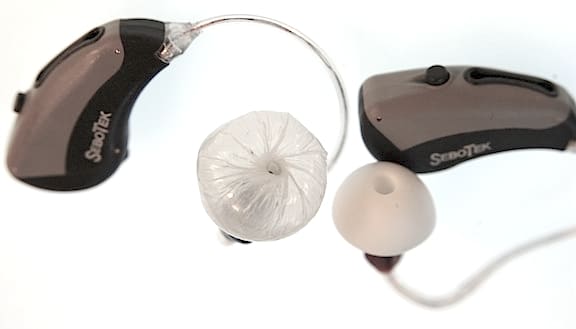This is a simple plea: let there be light.
If you’re speaking with people like me—who have hearing loss and who depend to some degree on speechreading—make sure we can see your face.
Your whole face. All the time.
That means no shadows. Examples of shadow-makers include baseball caps, light from beneath or above—which has the added disadvantage of making you look ghoulish—and dim lighting.
You might think, “C’mon! Even if there are shadows, you can still see the face beneath.” Perhaps, but shadows make understanding speech that much harder. And if only half of your face is visible, we’re not even getting half the message. Without the speech clues from your facial expressions, or in the movement of your jaw, lips, tongue and teeth, we might not understand you properly—or at all.
And please don’t stand in front of a window or other light source. This has the unfortunate effect of blocking out your features, like a person on those “real life” TV crime shows who may be in the witness protection program, or who must remain anonymous when spilling the beans, so the bad guys won’t identify and come after them.
And we shouldn’t have to remind you that we want the light on your face, not the back of your head. It’s rather difficult…let me amend that….it’s freaking impossible to tell what your lips are saying if they are invisible to us, pointed in another direction.
One of my early and most painful experiences of the facial blackout problem happened in Grade 9. Our class was having its first weekend class party and we were all excited because for the first time, this meant dancing. More importantly, it meant slow dancing which, in those days, involved clutching each other and swaying slowly from side to side, maybe making two full rotations by the end of the song. And adding to the excitement: the basement lights would be very dim or completely off.
Does this bring back warm and thrilling memories of your school days?
Those of us who were teenagers with hearing loss remember it differently. Look at it from a speechreader’s perspective; it was dark and your head was on somebody’s shoulder, which would be fine if the boy didn’t try to say anything while you were dancing.
And IF you heard him ask you to dance in the first place.
My girlfriends and I were sitting against the wall, pretending to groove to the music. A dark shape loomed in front of us. From the dim light outlining him, I recognized—oh, let’s call him Ryan—from his height and somewhat pointy head. He was my secret crush and my heart started beating faster.
But the shape didn’t appear to doing or saying anything, not from what I could hear, given the loud music and his blacked-out face. As the other girls just sat there, I wondered if he might possibly be asking me to dance. But what if I stood up just when the girl he was asking, stood up at the same time? How embarrassing would that be? To a 15 year-old, that would be humiliating beyond belief, causing a good cry in the bathroom and an attack of low self-esteem because of this stupid hearing loss!
So I just sat there, grooving. The figure turned and slunk away. My girlfriends turned on me, “You moron! Why didn’t you dance with him?” Even to them, I wasn’t going to admit my real problem. “Because I don’t like him, OK? He’s a goofball.”
I never had another chance with Ryan. But since then, I have a policy of not conversing with anyone whose face I cannot see.
The Speechreader’s Prayer 
May your words flow clearly
And may your lips move slowly
May the light shine nicely
Making your face all bright-ly.








…and why do people think that whispering in your ear is going to make it all understood??? My nose hears better than my ear…
I remember long before that I knew that I had a serious problem hearing(I was 16 the first time I was told), I was at my friends slumber partly. We had a game in which we were to whisper into another person’s ear what another person whispered in ours. Of course, what started out was not what ended up. I knew that I got it wrong but I bluffed it out. I guess that I didn’t want them to think that I was stupid.